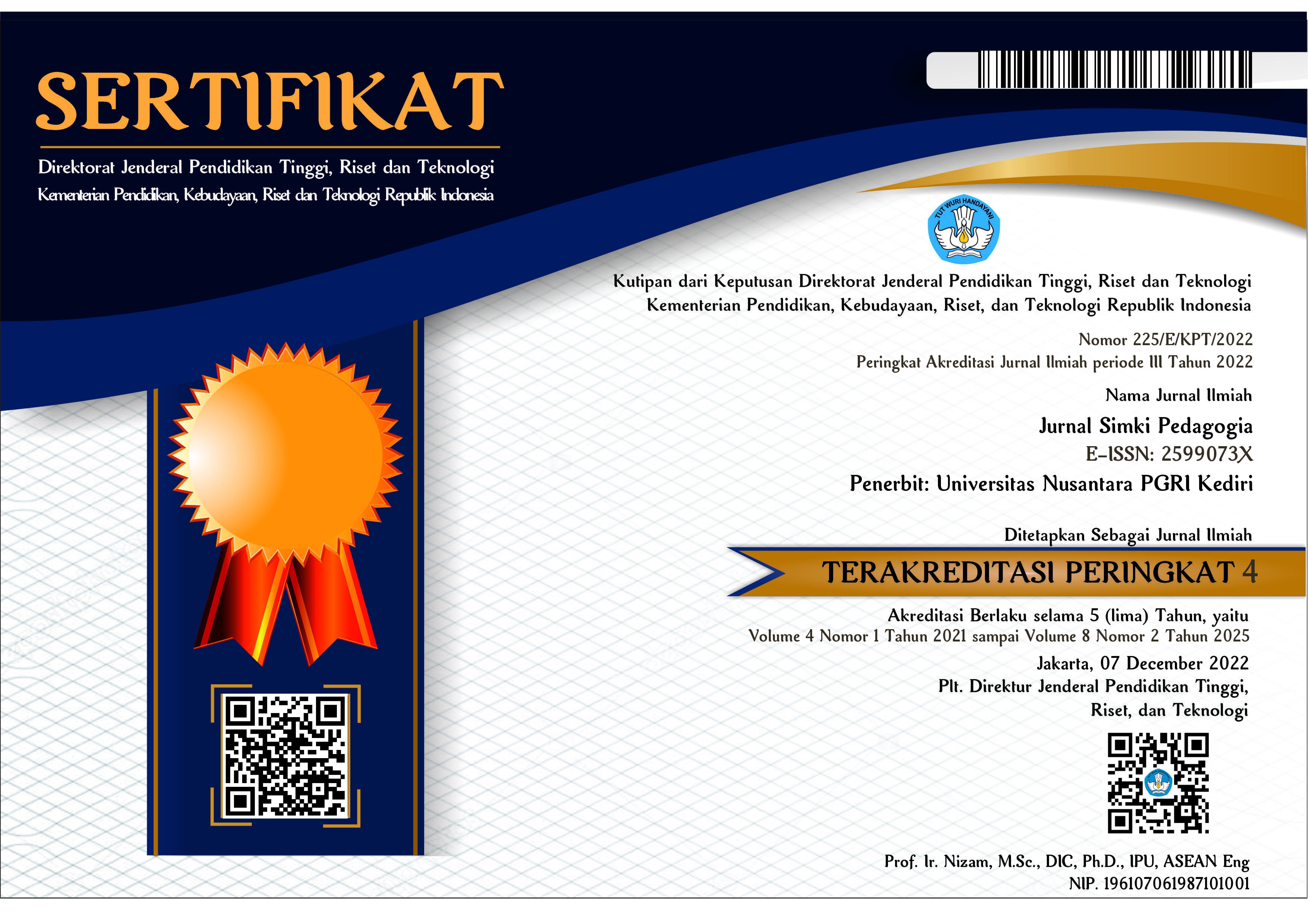Tindak Tutur Ilokusi dalam Berita "Program Vaksinasi Covid-19" Pada Laman Tribunnews.Com
 Abstract views: 567
,
Abstract views: 567
,
 PDF (Bahasa Indonesia) downloads: 726
PDF (Bahasa Indonesia) downloads: 726
Abstract
This study aims to describe the form of illocutionary speech acts in the news "Covid-19 Vaccination Program" on the TribunNews.com page. The type of research used is qualitative research. Sources of data in this study are primary data sources and secondary data. The data in this study are all illocutionary speech acts used in the news (in writing) "Covid-19 Vaccination Program" on the TribunNews.com page. Data collection techniques used are documentation techniques, reading techniques, and note-taking techniques. The results showed: The types of illocutionary speech acts consist of (a) assertive form (stating number (28), complaining amounting to (8), suggesting amounting to (12), and informing amounting to (28)), (b) directive form (ordering totaling (13), advising amounting to (10), asking amounting to (11), ordering totaling (1)), (c) expressive form (thanks amounting to (4), praising amounting to (2), blaming amounting to (2)), (d) commissive form (promising amounting to (3), offering something amounting to (1)), (e) form of declaration (exclusion amounting to (1), raising amounting to (1), giving name amounting to (1), punishing amounting to (1) The results of the speech act data in this study found as many as seventy-five (76) assertive speech acts, thirty-five (35) directive speech acts, eight (8) expressive speech acts, four (4) four commissive speech acts, four declarations ( 4) speech act The most dominating speech act in the news "Covid-19 Vaccination Program" on the Tribune page News.com is an assertive illocutionary speech act as many as seventy five (76) speech acts.
Downloads
References
Ardianto, Elvinaro. 2010. Metode Penelitian untuk Public Relations: Kuantitatif dan Kualitatif. Bandung: PT Simbiosa Rekatama.
Austin, J. L. (1962). How to do things with words. Oxford: Oxford University Press.
Chaer Abdul, Agustina Leon. 2010. Sosiolinguistik: Perenalan Awal. Jakarta: Rineka Cipta.
Grice, HP. 1975. Logic and Conversation. In Peter Cole and J.L. Morgan (eds.) Syntax and Semantics, Vol. 3: Speech Acts, New York: Aecademic Press.pp.41-58, diakses Jumat 24 November 2012.
Ibrahim, Syukur Abd. Kajian Tindak Tutur. 1993. Kajian Tindak Tutur. Surabaya: USAHA NASIONAL.
Leech, Geoffrey. 1993. Prinsip-prinsip Pragmatik. Jakarta: Universitas Indonesia.
Mardikantoro, Bakti Hari. 2014. “Analisis Wacana Kritis pada Tajuk Anti Korupsi di Surat Kabar Berbahasa Indonesia.” Litera, 13 (2): 215-225.
Partana, Paina. 2010. “Pola Tindak Tutur Komisif Berjanji Bahasa Jawa”. Jurnal Widyaparwa 38(01).
Rahardi, Kunjana. 2005. Pragmatik Kesantunan Imperatif Bahasa Indonesia. Yogyakarta: Erlangga.
Rusminto, Nurlaksana Eko. 2012. Analisis Wacana Sebuah Kajian Teoritis dan Praktis. Yogyakarta: Graha Ilmu.
Searle, J. R. (1976). Expression and meaning: Studies in the theory of speechacts. Cambridge: Cambridge University Press.
Sudaryanto. 2015. Metode dan Aneka Teknik Analisis Bahasa. Yogyakarta: Duta Wacana UP.
Sumarsono. 2009. Sosiolinguistik. Yogyakarta: Pustaka Pelajar.
Tarigan, Henry Guntur. 2015. Pengajaran Pragmatik (Edisi Revisi). Bandung: Angkasa.
Yule, George. 2006. Pragmatik (Edisi Terjemahan oleh Indah Fajar Wahyuni). Yogyakarta: Pustaka Pelajar.
Copyright (c) 2021 Choirul Nisa

This work is licensed under a Creative Commons Attribution 4.0 International License.

Jurnal Simki Pedagogia : https://jiped.org/index.php/JSP/index is licensed under a Creative Commons Attribution 4.0 International License.
















